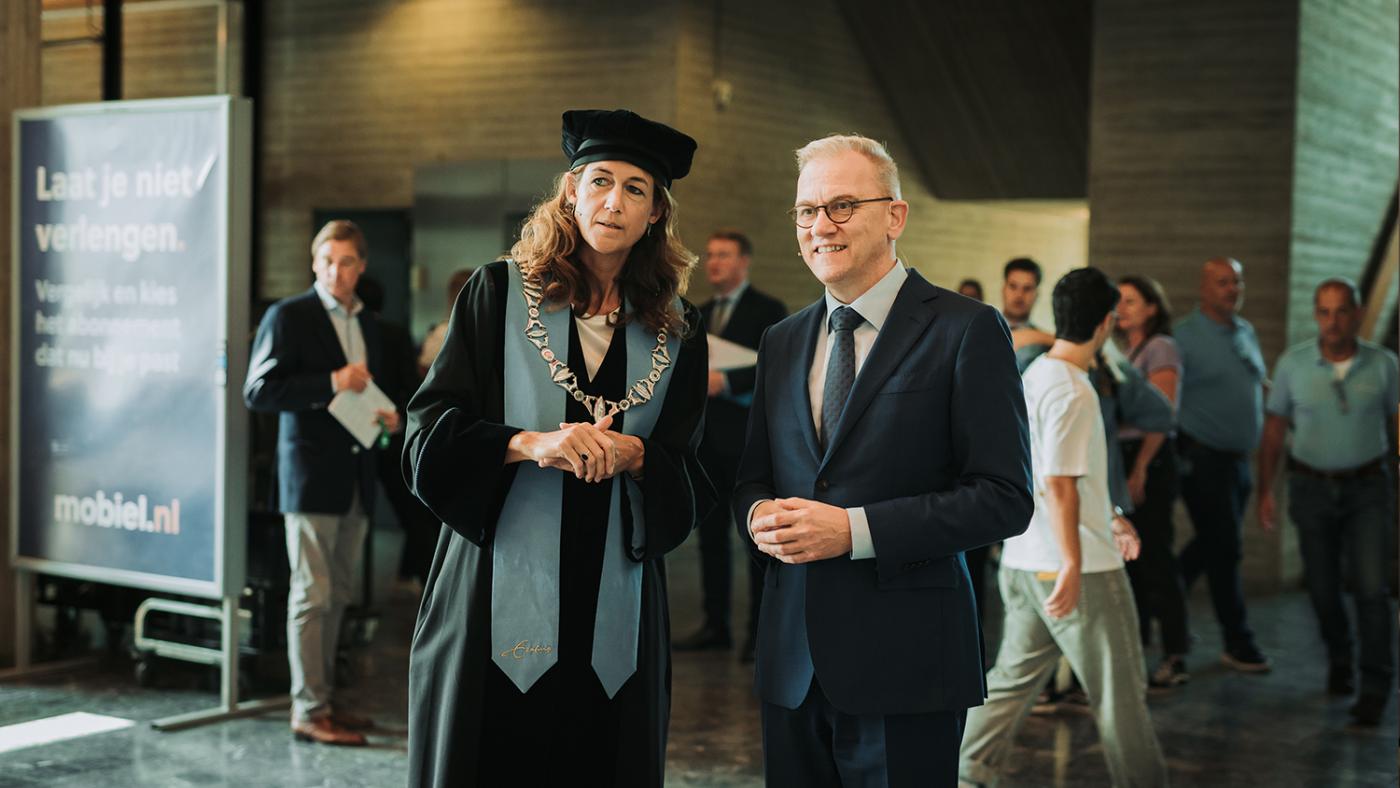At the Opening of the Academic Year
Even Bruins calls budget cuts “painful” and “ugly”

In his speech, the minister emphasised that the budget cuts to higher education and research were not his idea. What's more, he finds them “ugly” and “painful”. However, in his view, the fact that he knows how painful the cutbacks can make him the most equipped person to ensure the damage is limited.
“I hope people will look back with a bit of mercy and say: 'He tried his best.” With that remark, Bruins managed to gain some sympathy from a grumbling audience at Erasmus University Rotterdam.
Lion’s den
The minister stepped into the lion’s den when participating in the Opening of the Academic Year in Rotterdam. And he got what he probably expected to get at Erasmus University: one plea not to make the cuts after another. The rector of Erasmus University, Annelien Bredenoord, told Bruins that the cutbacks are penny wise and pound foolish, as the minister listened from the front row.
The rector compared science to a Jenga tower, saying that the government is pulling out crucial blocks, compromising the tower's structure: fewer international students and less money for young scientists will lead to less innovation and less economic growth.
Ed Brinksma, the departing President of Erasmus University's Executive Board, also made his dissatisfaction clear. “I urge the minister to abandon this disastrous course. By retreating behind our dikes, we will only become more of a pawn in international movements.”
“No destruction”
Earlier that same afternoon, the minister visited the Rotterdam University of Applied Sciences, where he spoke to ten students enrolled in teacher training programmes. At the end of the session, a student urged him not to make the cuts. Bruins’ response was immediate: “I agree the cutbacks are quite ugly. But I’ll fight to make sure no valuable things will be destructed.”
A staff member of the university of applied sciences thought his answer was strange. As soon as the minister left, she said to the students: “Isn’t it weird for him to pretend he’s not responsible for the budget cuts? It sounds very friendly, but he’s the one who put his signature underneath it.”
Indeed, Bruins is trying to combine his responsibility for tough policy with a message of hope and pugnacity. He had already seen a video comparing science to a Jenga tower, the minister said on stage at Erasmus University. “I will not be the minister who removes the last block.”
“Not left me unmoved”
Is he distancing himself from his own cutbacks? Bruins wasn’t there when the parties in the coalition (PVV, NSC, VVD and BBB) negotiated the outline agreement. But, he said the following to press agency HOP: “I cannot distance myself from the cutbacks. I said yes to the outline agreement and I’ll have to implement it. But I’m talking to the association of Dutch Universities, UNL, and the Association of Universities of Applied Sciences, as well as other parties and the government, about how we can go about it sensibly.”
Bruins emphasised how he finds the end of the sector plans “painful". According to UNL, the measure could cost 1,200 jobs. “That has not left me unmoved,” said the minister. The fine for students who take longer to graduate than the standard duration of their programmes is another “really ugly measure” that may already be making students insecure. But the bottom line is: The financial section of the outline agreement is leading.
So why be involved in the first place? In his speech, the minister explained that he wants to take responsibility at this difficult time. Now more than ever, the Netherlands needs a minister who knows how valuable education, culture and sciences are, Bruins stated. “Someone who knows how we can preserve that which is valuable.” He reiterated that he will fight for it.
“Simply devastating”
Many university administrators used the ceremonies to mark the start of the new academic year to aim at the new government. “Strange, harmful and weird”, UU President Anton Pijpers said about the cutbacks in higher education and research. “Simply devastating.”
At the University of Amsterdam, Executive Board President Edith Hooge said they are “the largest and most reckless cutbacks in higher education of the past decades, amidst a bleak anti-intellectual climate in the Netherlands and elsewhere.”
Similar things were said at universities of applied sciences. Saxion President Anka Mulder criticised the slow-progress fine on Tuesday afternoon. “Many students are seventeen when they start. At that age, it’s not surprising if you don’t immediately pick the right study programme. Some are informal caregivers or elite athletes and therefore need more time.”
Sarah Wilton-Wels, from the Rotterdam University of Applied Sciences, labels the fine as “unexpected, ill-considered and impracticable”. Some administrators are calling for action. “We must make ourselves heard”, opined departing Executive Board President Jacomine Ravensbergen, from Avans.